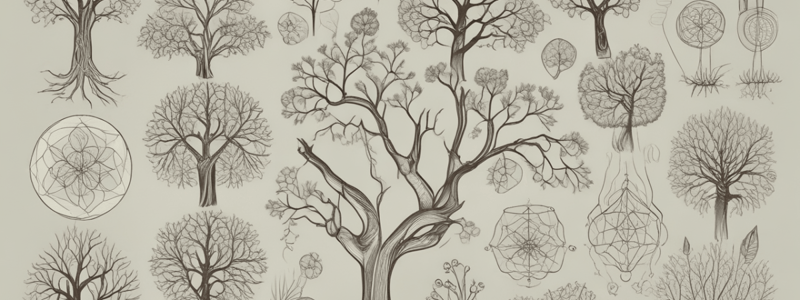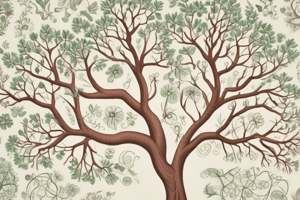Podcast
Questions and Answers
Which of the following is NOT a branch of biology?
Which of the following is NOT a branch of biology?
- Botany
- Astrology (correct)
- Ecology
- Genetics
What is the basic structural and functional unit of life?
What is the basic structural and functional unit of life?
- Organism
- Cell (correct)
- Organ
- Tissue
Which of the following biological molecules is primarily responsible for providing energy to cells?
Which of the following biological molecules is primarily responsible for providing energy to cells?
- Nucleic Acids
- Lipids
- Proteins
- Carbohydrates (correct)
Flashcards are hidden until you start studying
Study Notes
Definition of Biology
- Biology is the scientific study of life and living organisms
- It explores the structure, function, growth, evolution, distribution, and taxonomy of living things
Branches of Biology
- Botany: study of plants
- Zoology: study of animals
- Microbiology: study of microorganisms such as bacteria and viruses
- Ecology: study of the interactions between organisms and their environment
- Genetics: study of heredity and variation
- Molecular Biology: study of the structure and function of biomolecules such as DNA and proteins
- Cell Biology: study of the structure and function of cells
- Evolutionary Biology: study of the processes that have shaped the diversity of life on Earth
Levels of Organization
- Molecule: basic building blocks of life (e.g. DNA, proteins, carbohydrates)
- Cell: basic structural and functional unit of life
- Tissue: group of similar cells that perform a specific function
- Organ: structure composed of two or more types of tissue that perform a specific function
- Organ system: group of organs that work together to perform a specific function
- Organism: individual living thing (e.g. human, plant, animal)
- Population: group of organisms of the same species that live in a specific geographic area
- Community: group of different species that live in a specific geographic area
- Ecosystem: community of organisms and their physical environment
- Biosphere: all living things on Earth and their interactions
Biological Molecules
- Carbohydrates: provide energy and structure for cells (e.g. glucose, cellulose)
- Proteins: perform a wide range of functions (e.g. enzymes, hormones, structural proteins)
- Lipids: provide energy and structure for cells (e.g. fats, oils)
- Nucleic Acids: contain genetic information (e.g. DNA, RNA)
Cellular Processes
- Metabolism: conversion of energy and nutrients into cellular components
- Photosynthesis: process by which plants convert light energy into chemical energy
- Cellular Respiration: process by which cells convert glucose into energy
- Mitosis: process of cell division that results in two daughter cells with the same number of chromosomes as the parent cell
- Meiosis: process of cell division that results in four daughter cells with half the number of chromosomes as the parent cell
Definition of Biology
- Biology encompasses the scientific exploration of life and living organisms.
- It investigates various aspects such as structure, function, growth, evolution, distribution, and taxonomy of organisms.
Branches of Biology
- Botany: Focuses on plant life and their processes.
- Zoology: Centers on the study of animal life.
- Microbiology: Examines microorganisms, including bacteria and viruses.
- Ecology: Analyzes the relationships between organisms and their environments.
- Genetics: Investigates heredity and genetic variation among organisms.
- Molecular Biology: Studies the structure and function of biomolecules such as DNA and proteins.
- Cell Biology: Explores the composition and function of cells.
- Evolutionary Biology: Looks into the processes that have led to the diversity of life on Earth.
Levels of Organization
- Molecule: Represents the fundamental building blocks of life, including DNA, proteins, and carbohydrates.
- Cell: The basic structural and functional unit of all living organisms.
- Tissue: Consists of a group of similar cells dedicated to a specific function.
- Organ: Composed of multiple tissue types that execute a distinct function.
- Organ System: A collection of organs that collaborate to accomplish a particular set of tasks.
- Organism: An individual biological entity such as a human, plant, or animal.
- Population: A cluster of organisms of the same species inhabiting a defined geographic region.
- Community: Various species coexist within a particular geographic area.
- Ecosystem: Encompasses the community of organisms along with their physical environment.
- Biosphere: Represents all life forms on Earth and their interconnected relationships.
Biological Molecules
- Carbohydrates: Serve as energy sources and structural components in cells, examples include glucose and cellulose.
- Proteins: Facilitate a multitude of functions in living organisms, including enzymes, hormones, and structural proteins.
- Lipids: Offer energy storage and structural support for cells, with examples such as fats and oils.
- Nucleic Acids: Store and transmit genetic information, including DNA and RNA.
Cellular Processes
- Metabolism: The biochemical conversion of energy and nutrients into necessary cellular components.
- Photosynthesis: The technique employed by plants to transform light energy into chemical energy.
- Cellular Respiration: The process where cells convert glucose into usable energy.
- Mitosis: Cell division resulting in two identical daughter cells retaining the same chromosome number as the parent cell.
- Meiosis: A specialized type of cell division leading to four daughter cells, each with half the chromosomes of the original cell.
Studying That Suits You
Use AI to generate personalized quizzes and flashcards to suit your learning preferences.




